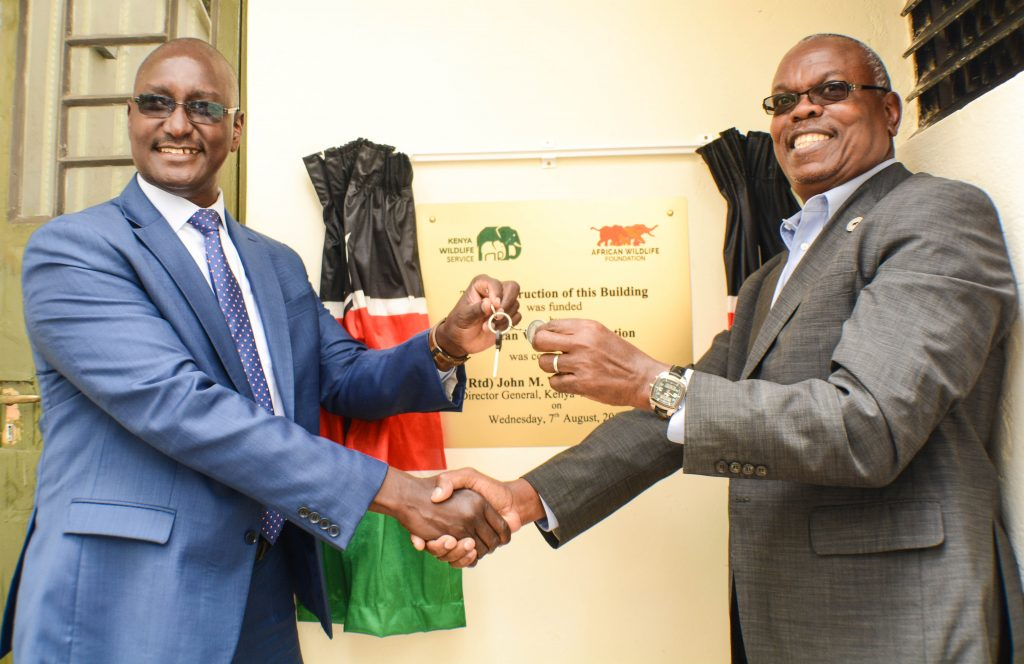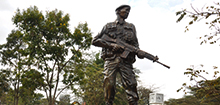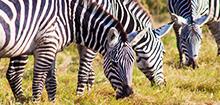
African Wildlife Foundation (AWF) has demonstrated its support for KWS’ consistent battle against wildlife crime by financing the construction of an evidence storage room worth over 5 million shillings, with accompanying accessories, at KWS headquarters.
Dr. Philip Muruthi, AWF’s Vice President for Species Conservation in-charge of the organization’s species protection strategy said in the past, finding suitable storage for exhibits – some of which are perishable – oftentimes resulted in cases being lost in court because of insecurity posed by insufficient or unsuitable evidence storage.
He said the Evidence Room structure may appear insignificant to the casual observer, but urged that it be looked at from the broader perspective of wildlife conservation, which focuses on combating and eventually curbing illegal wildlife trade.
Dr. Muruthi applauded the recent removal of Kenya, Uganda and Tanzania from the list of the ‘gang of eight,’ saying that we still cannot afford to rest on our laurels, because, while the poaching crisis of 2007 has abated to a large degree, it is still imperative to find out what makes Kenya such an attractive transit point for wildlife contraband.
He stated that once the success of the room has been assessed, similar ones would be constructed in other conservation areas in due course. He praised KWS K9 and Wildlife Protection Units for their behind-the-scenes work in making arrests, saying that it was unfortunate that promising cases are sometimes lost due to the manner in which evidence is handled, leading to prosecutions not being sufficiently thorough.
He stressed that the demand for wildlife trophies needed to be nipped in the bud. “We are not ready for another elephant ivory trade surge,” he said.
Kenya Wildlife Service (KWS) Director General Brigadier (Rtd) John Waweru expressed appreciation to AWF for their benevolence in donating the Evidence Room, saying that it could not have come at a better time, because during the CITES CoP18 meeting slated for later this month in Geneva Kenya will present eight proposals, one of which is ‘No Trade in elephant ivory.’
He stated the importance of a secure place to store evidence, and also a separation between evidence still being presented in court and that meant to be stored after cases are concluded.
The Director General was optimistic that no more wildlife crime cases would be lost in court, as had happened in the past, due to evidence tampering, loss and decay of evidence.
“The KWS/AWF collaboration will enable us to secure Kenya’s heritage for the younger generations,” said Brig (Rtd.) Waweru.
KWS Acting Director for Security, Nancy Kabete said the KWS armory was in the past used as storage for evidence, which was far from ideal. She explained that KWS, through Security Division, approached AWF with a proposal to collaborate in raising the success rates in the prosecution of wildlife crimes, to which the latter graciously agreed, resulting in the construction of the Evidence Room. “This will go a long way in ensuring that the Chain of Custody is not interfered with, which will meet the stringent international standards of how to deal with exhibits and present them in court”, she said.
The Evidence Room is secured on the outside with razor wire atop the perimeter gate, two dome CCTV cameras and a biometric door. Windows are emergency break glass, barred with burglar proofing and wire mesh. For extra security, a door controller will restrict access to the premises, within which are several storage shelves, marble slab tables presumably for evidence examination, an air conditioner and special fluorescent lighting.
Future collaboration with AWF will see the installation of cold storage (when bush meat is seized) and state-of-the-art combination safes to store valuable evidence.





